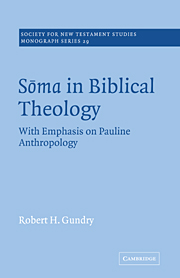Book contents
- Frontmatter
- Contents
- Acknowledgements
- Abbreviations
- PART I FOR AND AGAINST A HOLISTIC DEFINITION OF SŌMA
- 1 Sōma as the whole person: the rise of a definition
- 2 Sōma in extra-Biblical literature
- 3 Sōma in the LXX
- 4 Sōma in the NT outside Pauline literature
- 5 The alternation of Sōma with personal pronouns in Pauline literature
- 6 Sōma elsewere in Pauline literature
- 7 Sōma in I Cor 6: 12–20
- PART II SŌMA IN THE FRAMEWORK OF ANTHROPOLOGICAL DUALITY
- PART III THE THEOLOGY OF SŌMA AS PHYSICAL BODY
- Select bibliography
- Index of passages cited
- Index of authors
7 - Sōma in I Cor 6: 12–20
Published online by Cambridge University Press: 14 January 2010
- Frontmatter
- Contents
- Acknowledgements
- Abbreviations
- PART I FOR AND AGAINST A HOLISTIC DEFINITION OF SŌMA
- 1 Sōma as the whole person: the rise of a definition
- 2 Sōma in extra-Biblical literature
- 3 Sōma in the LXX
- 4 Sōma in the NT outside Pauline literature
- 5 The alternation of Sōma with personal pronouns in Pauline literature
- 6 Sōma elsewere in Pauline literature
- 7 Sōma in I Cor 6: 12–20
- PART II SŌMA IN THE FRAMEWORK OF ANTHROPOLOGICAL DUALITY
- PART III THE THEOLOGY OF SŌMA AS PHYSICAL BODY
- Select bibliography
- Index of passages cited
- Index of authors
Summary
Yet another possible indication of a holistic sense of sōma appears in a pair of parallel statements rather widely separated: ‘Do you not know that your bodies are members of Christ?’ (I Cor 6: 15a); ‘Now you are the body of Christ and individually members of it’ (I Cor 12: 27). In the one, ‘bodies’ are members of Christ; in the other, ‘you’ are members. ‘Bodies’ and ‘you’ alternate with the result that ‘bodies’ takes on the meaning ‘your whole persons’. Or so we might think.
The personal pronoun ‘you’ is not limited to man's physical aspect in the statement ‘Now you are the body of Christ’. The whole person belongs to Christ's Body. (The exact force of ‘the Body of Christ’ does not affect the point made here.) But we need to ask, does the general statement of Paul concerning the whole person's membership in Christ's Body preclude his making a more specific statement elsewhere that a part of man's constitution belongs to Christ? It it possible that in a context quite different from that of the discussion concerning spiritual gifts, Paul may have limited his field of vision to the membership of the believer's physical body in Christ without ruling out the membership of the entire person of the believer? The answer lies in a close and lengthy look at the much-analyzed passage, I Cor 6: 12–20:
‘All things are lawful for me’, but not all things are helpful. ‘All things are lawful for me’, but I will not be enslaved by anything. […]
- Type
- Chapter
- Information
- Soma in Biblical TheologyWith Emphasis on Pauline Anthropology, pp. 51 - 80Publisher: Cambridge University PressPrint publication year: 1976



